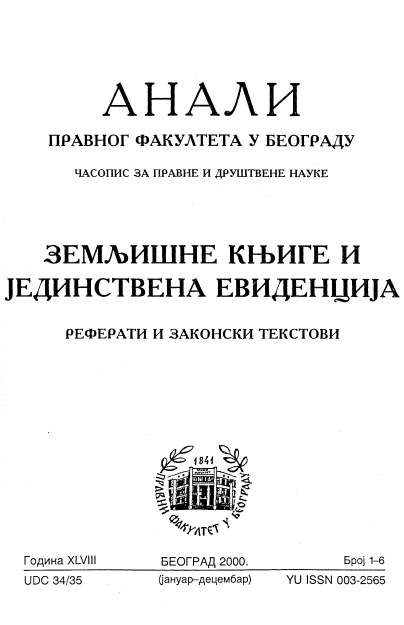ОД КАТАСТРА ЗЕМЉИШТА ДО ТЗВ. ЈЕДИНСТВЕНЕ ЕВИДЕНЦИЈЕ!? (Суочавање са чињеницама)
FROM LAND CADSTRE TO THE SO-CALLED UNIFIED DATA
Author(s): Milanko BuljugićSubject(s): Administrative Law
Published by: Правни факултет Универзитета у Београду
Keywords: Land cadastre; Land register; Unified data
Summary/Abstract: Thе so-called unified data system has some irreparable conceptual faults which make its development impossible. Its being accepted as official is a result of long years of geodetic circles' endeavors to seize even those responsibilities for which they are not competent, as well as their need to conceal the fact that many jobs which the Republic's Geodetic Institute has been paid for have not been completed, and not a result of real interests and needs of the society. Land cadastre, as a basis for land register, began to turn into something else when the obligations of its adjustment with land register, as well as with the real situation in the field were omitted from the new Yugoslav legislation in 1953, and 1965 and 1967, respectively. Provisions prohibiting the registration of legally unfounded changes and the conditioning of the registration of change with the payment of tax have additionally contributed to a distortion of the aim of land cadastre, creating an illusion of its legal character. A significant flaw of the unified data system is the fact that data from the land cadastre are being now copied into it as legal ones, though they have no legal basis. The land cadastre, its not being up-to-date, and human resources in that area have been repeatedly criticized by the Assembly of the Republic of Serbia, and it is obvious that the introduction of the unified data system was not an objective need, but a clear and subjective interest of geodetic institutes which, having been paid for a job never completed, saw in it a way out. The Assembly of the Republic of Serbia agreed with the introducing of the new registering system only when the wife of the Assembly's president became the head of the Belgrade Geodetic Institute, due to some falsely presented data concerning the experimental application of the new system in a few cadastral municipalities. It is, therefore, proposed that the land cadastre, containing factual data, should be renewed, as well as the land register, containing legal data of immovables, handled by the court.
Journal: Анали Правног факултета у Београду
- Issue Year: 48/2000
- Issue No: 1-6
- Page Range: 304-335
- Page Count: 32
- Language: Serbian

